By Matteo Travers, Community Manager
Today I sat down with Dr. James Lorello, Dean of Students at Verto Education. In this interview, James shares his background, student life at Verto, and self-authorship theory. Read on below or watch the recording!

Matteo: What’s your background, and what has it been like working at Verto as the Dean of Students?
Dr. Lorello: My background has always been in higher education. I grew up in Pennsylvania in the Poconos, and was born in Queens, New York. I made my way to Florida in the middle of high school, which was a really hard transition. Your junior year of high school, not fun. I ended up going to the University of South Florida for undergrad. I failed chem 2, and I was taking bio at the same time, and I realized I needed to change from pre-medical sciences to religious studies and anthropology. So that’s what I did, but I didn’t know what I wanted to do, so I changed to becoming a Resident Assistant at the university. I had done that for a semester, and I got really into it. My supervisor was like, hey, you can go to grad school for this. So I did.
I ended up going to Appalachian State University for grad school and got my Master’s in College Student Development, kind of like Counseling for College Students. And since then, I’ve always worked in student housing, such as the residence director or in a Dean of Students Office as a case manager, and worked my way up through student conduct and conflict resolution. I got my doctorate in 2019 at the University of North Carolina Greensboro, one of Verto’s newest partners. And then I was at UNC Charlotte as Associate Dean of Students in the Office of Conflict Resolution and saw Verto and thought this was such a cool program that I would have the opportunity to build student life from the ground up, which is something I dreamed about doing.
I always wanted to be a Dean of Students, and I still want to be a Vice President, maybe even a President of a university one day. But as Verto Dean of Students, I’ve had a lot of fun in my year and a half. So I started in March of 2022, and it’s been awesome since then. We got to sort of redevelop student life. All the Verto Discovery activities, all of that’s been really fun.
I think next, I want to continue to connect with students more and figure out what it looks like to be a dean of students at a global organization across the world. So it’s been exciting and a lot of fun and great to watch students grow while they’re with us.
Matteo: How does student life at Verto differ from other college experiences?
Dr. Lorello: You know, student life is really one of a kind here. It’s much more intentional than you’re going to find at a regular university, a regular college, for instance, or even other study abroad programs. We’ve developed it from the ground up with the theory of self-authorship in mind, which is to say how folks are going to develop along their journey. And with that, it’s just something that doesn’t exist [on other campuses].
We also provide such a different level of support with our Care Teams, in which you get personalized support from a team that hopefully becomes your little group while you’re abroad. When you’re among 100 plus students at a site, you are also among 30, 35 students or so, and that becomes a bit of a little team that you’re a part of, almost like a Harry Potter house.
You’re not going to get that kind of level of support at university, especially in your first semester of college. You really have to figure out a lot more things on your own. And there’s not the same sort of intention-setting that takes place for your growth, like trying to develop you over time, that you figure out what in the world you want to do with your life.
You don’t have to have it all figured out when you get to Verto. And that’s what we’re kind of here for, is to allow you to have these experiences abroad that hopefully change the way you think about the world and the way you think about yourself.
Matteo: What is self-authorship theory and why is Verto obsessed with it?
Dr. Lorello: Self-authorship theory is one of the first theories I learned about in my grad program for student affairs and college students understanding college students and it’s by this professor and faculty member, Marcia Baxter-Magolda. She developed it in the early 2000s, which really is when a lot of literature came out about it. But basically, it says that adults, adult learners in particular college students, go through several phases of development. And in order for that development to occur, you have to have certain experiences over time.
So you might start, as many of you might think, or as I did myself, in high school. And around that time, you often are always looking for what the answer is, from your parents, perhaps, or from a faculty member or a teacher. You always think they have the right answer, and then slowly that changes, and you realize that the world isn’t what you thought it was.
And so self-authorship theory is about you progressing through that and figuring out okay, who am I within this world around me? How do I make relationships in the world around me? And then what do I do with that? So the last phase of self-authorship theory is really hard to attain. It’s one that I probably am not even at, where you’re fully self-authored, you know exactly what you’re doing, and you’re focused on your values every time you do them, and that’s not going to happen in three months to a year at Verto. But the goal is to get you on the path of self-authorship.
So why is Verto obsessed with it?
Because it really brings meaning into the work that we’re doing with students. This is something that would naturally occur. Developing your own self-authorship by taking a trip abroad, for instance, or going into a culture that’s different from your own, you’re naturally going to have experiences that are going to change the way you view the world. But at Verto, what we’re trying to do is make that more intentional, and speed up the growth a little bit so that you can really reflect on your experiences a bit more than you would somewhere else.

Matteo: How do students engage and connect with one another before going abroad?
Dr. Lorello: It starts the second that you say, “I’m coming to Verto”. How you engage is about what you put in also, right? We’re going to have resources, we’re going to have activities. You’re going to hear a lot from Matteo about exciting experiences from your Student Onboarding Advisors, and then it’s up to you to engage in that and work with that material to connect with one another before you go abroad. So there’s going to be different events. You’ll be able to connect on CampusGroups and get to know different people from around the world. You might see other blogs, even where it’s other students who met each other in pre-departure and then ended up going to the same site and being roommates.
All of that is to say, we’re going to create an intentional space for you to do this, and the hope is that you take that and run with it. And it doesn’t have to be what we create either. It may be that Matteo sets up something on CampusGroups and you make a connection with folks, and then you get a group chat going. That’s also a great connection and a way for you to get to know each other before going abroad. But hopefully, we’re able to inspire that.
Matteo: What events or activities at Verto have become important and/or benefited the students?
Dr. Lorello: We really like to talk about the journey of coming to Verto as writing your own story, as putting together the chapters of your own story. This begins in pre-departure orientation where you’re better understanding why you’re taking this trip abroad, what you’re doing, and what resources you need to do this. Then from there, when you get on-site, there is going to be what’s called Discovery Week. During that period of time is when you’re doing basically an on-site orientation where you’re getting to know the location, you’re getting to learn about your Care Team, and meeting other students across the site. And so you start to do some of that work.
One of the first activities that you’ll do at your site is a letter to yourself that you’ll be able to open and read at the end of the semester, where you write to yourself and the person you want to be at the end of the semester. Then you’ll get to see that over time. And that starts, like I said, from Discovery Week. We also have our Wellness Week, which occurs each semester. Some sites turn it into even a month depending on how it’s going. And this is to help you kind of focus on midterms and reset during that mid-semester funk that folks might get into.
You’re also going to have Care Team Circles that you have with those other students that you talked about, where you’re going to meet weekly, at least for the first six weeks, to get to know those folks and do different activities that are meant to help you on your journey. One of them will be about homesickness, for instance, because that’s something that folks will experience for a few weeks. We’ve got a lot of these rituals all themed around this idea of writing your own story, and we try to intentionally use that language. You’ll have one-on-ones with your Academic Success Coordinators and Student Life Coordinators and those we call bookmarks because they’re meant to be check-ins along the way during your journey.
These rituals will continue to grow, and we’d love to know what you also contribute. Part of creating that culture of discovery and that culture of self-authorship is for you all to contribute and provide different activities yourselves, including clubs and organizations that you might lead, starting with a club council over the summer that Matteo leads. And then what you end up doing when you come on-site, whether that’s a Dungeons and Dragons club or a Cooking Club, it could be anything.

Matteo: How do you see students grow/growth from when they find out they are going to abroad, when they are abroad and after?
Dr. Lorello: One of my favorites was a parent that I connected with during my first semester in Costa Rica. His daughter was in Costa Rica, and I remember he came to Costa Rica with her. He was nervous. She was nervous. They came together to kind of do the whole moving process like it was a traditional university. And I remember that moment. And he was really nervous when he left. There were a lot of tears when he left, and he wasn’t sure that she would make it. She was somebody who wasn’t a straight-A student in high school, right, and was really hoping that doing this study abroad experience with Verto would help them grow and find themselves and become a better academic student and a better person.
You know, of course, there were some struggles in the beginning, but they finished the first semester, and lo and behold, they went to another semester. They went from Costa Rica, and then they went to Spain for the spring semester. And we sent out our last family newsletter at the end of the spring semester. And this dad had emailed me and said, I just wanted to tell you what a great experience it was, and went on about how she went from a 2.5 GPA to above a 3.0 at the end, and how she now wanted to even maybe go to college abroad.
She wasn’t sure what she wanted to do before then, but that’s what she kind of was thinking, and she had a better sense of what she wanted to do and where she wanted to go to school back home, those sorts of things. She had more of a formulated plan in coming with Verto. And so we exchanged text messages, and he sent me some great pictures of even when his last day that he was with her in Costa Rica compared to the next year. And he said the best quote from him was that she’s a different person entirely. She’s not the same person that I dropped off in a good way in August of that year.
Matteo: What advice do you have to a student who wants to make the most of their experience abroad?
Dr. Lorello: I think the biggest thing I would say is to just take advantage of those opportunities while you’re getting to do this. It’s so unique that you get to, and so taking advantage of the activities, the excursions, the opportunities that you’re going to get while you’re abroad are just really important. Soak it in, engage in it, and don’t miss the chance for reflection that it goes by too fast and you’re taking too many pictures and videos. You want those to remember. But remember also to just be in the moment and enjoy the experience that will be a once-in-a-lifetime thing and make those connections with the people around you, because the way that you develop community is going to stick with you for the rest of your life, so make the most of it.
And the way that you do that is by taking the opportunities when they come.


